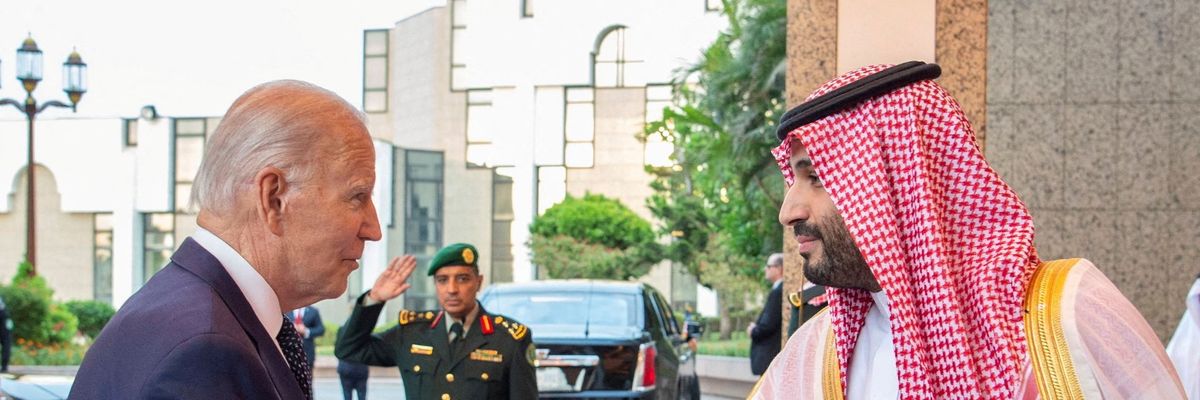It seems OPEC's major snub to the Biden Administration has done what the war in Yemen and the murder of Jamal Khashoggi could not: get members of Congress mad enough to call for the dissolution of the entire relationship with Saudi Arabia and the United Arab Emirates.
The OPEC+ decision to cut oil production by two million barrels yesterday has been described as "a blow against (President) Biden", and members on both sides of the congressional aisle have been fuming. But a trio of House members are taking it one step further, introducing a bill that would take all U.S. troops, weapons, and missile defense systems out of Saudi Arabia and the UAE. From a statement by Reps. Tom Malinowski (D-N.J.), Sean Casten (D-Ill.) and Susan Ellis Wild (D-Penn.):
“Saudi Arabia and the UAE’s drastic cut in oil production, despite President Biden’s overtures to both countries in recent months, is a hostile act against the United States and a clear signal that they have chosen to side with Russia in its war against Ukraine. Both countries have long relied on an American military presence in the Gulf to protect their security and oil fields. We see no reason why American troops and contractors should continue to provide this service to countries that are actively working against us. If Saudi Arabia and the UAE want to help Putin, they should look to him for their defense.
This decision is a turning point in our relationship with our Gulf partners. If Saudi Arabia and the UAE hope to maintain a relationship with the United States that has been overwhelmingly beneficial to them, they must show a greater willingness to work with us — not against us — in advancing what is now our most urgent national security objective: the defeat of Russia's aggression in Ukraine."
Biden has drawn fire for months for his deferential treatment of the Arab dictators in an apparent attempt to stem a global economic crisis unleashed in part by the Ukraine War, subsequent Western sanctions, and Russian counter moves, including the decision to cut off gas flows to European countries. In other words, it is a mess, and critics say it has forced the administration to overlook the human rights abuses of both countries while sweetening the pot with massive new arms deals.
After a high-profile visit to the region and the infamous "fist bump" with Crown Prince (and now Prime Minister) Mohammed bin Salman, the White House announced deals totaling $5 billion worth of missile defense systems for Saudi Arabia and UAE. Bipartisan attempts to question such deals, dating back to the Trump administration, continue to fall flat.
As for the number of troops in the region, it's hard to pinpoint, but it's certainly nothing to sneeze at. According to the New York Times in 2021:
"There are between 45,000 and 65,000 American military personnel — the number can vary by the day — now deployed in Saudi Arabia and other Persian Gulf nations, including around 5,500 troops in Iraq and 600 in Syria."
Unfortunately, astute analysts all over the political spectrum have been warning the president that these dictators are looking out for their own interests — and the Western investment in Ukraine is not on the priority list. In fact, they may be working against the West's goals, keeping their own connections with Russia front and center. They certainly don't buy into the 'democracies versus autocracies' frame.
As Trita Parsi of the Quincy Institute argued after Biden's Middle East trip in late July:
The trip was meant to present Biden at his best — a foreign policy giant who dealt with the world as it is and who understood when geopolitical imperatives must trump values and human rights. The problem with this framing was not that human rights were sacrificed at the altar of security interests (they always are, notwithstanding American rhetoric), but that the prospects of securing any major geopolitical gains were minute at best and never sufficient to justify the humiliation of Biden’s caving to MBS.
As the humiliations keep coming, it's not surprising that some in his party are pleading for Biden to stop. It's time to truly take U.S. interests into account, and sending our troops and resources to fair-weather friends is clearly not one of them.
















